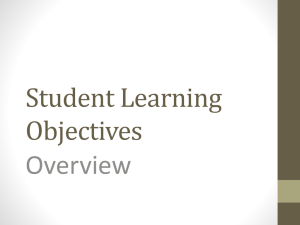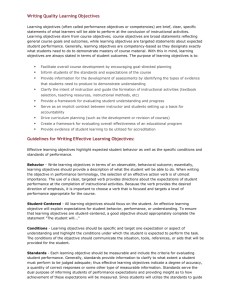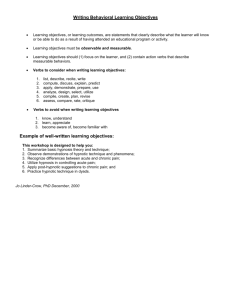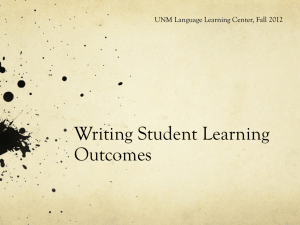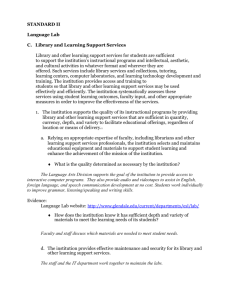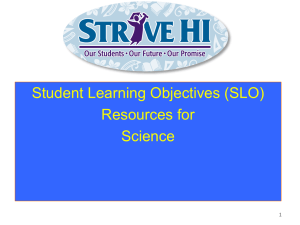Guidelines for Writing Effective Student Learning Outcomes (SLO`s)
advertisement
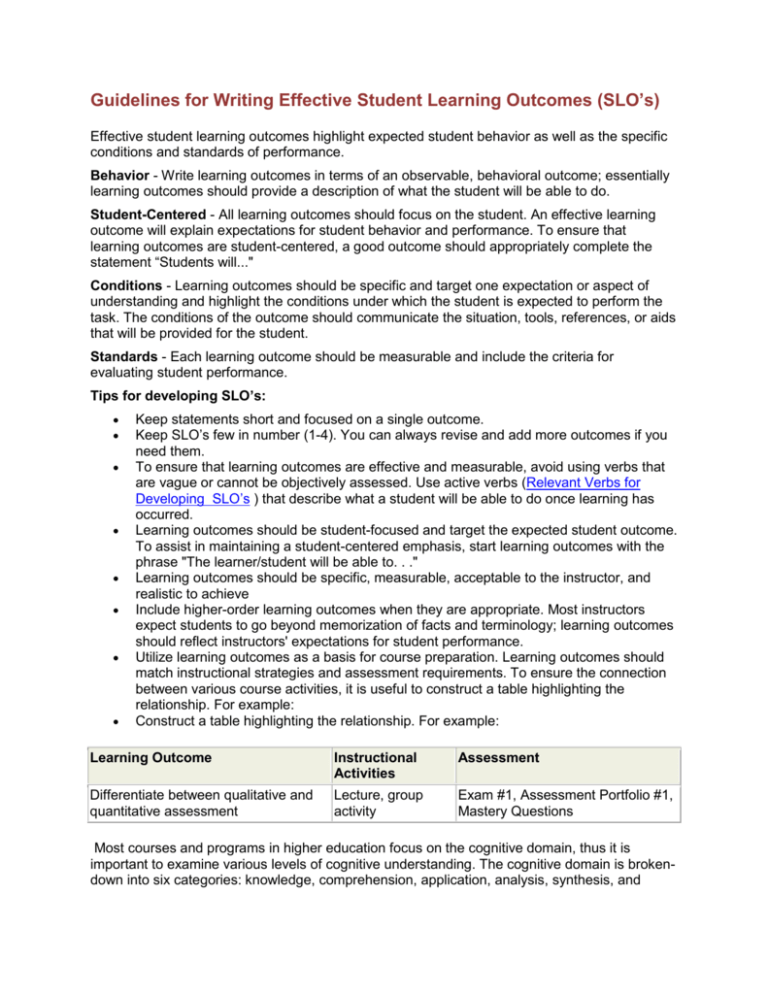
Guidelines for Writing Effective Student Learning Outcomes (SLO’s) Effective student learning outcomes highlight expected student behavior as well as the specific conditions and standards of performance. Behavior - Write learning outcomes in terms of an observable, behavioral outcome; essentially learning outcomes should provide a description of what the student will be able to do. Student-Centered - All learning outcomes should focus on the student. An effective learning outcome will explain expectations for student behavior and performance. To ensure that learning outcomes are student-centered, a good outcome should appropriately complete the statement “Students will..." Conditions - Learning outcomes should be specific and target one expectation or aspect of understanding and highlight the conditions under which the student is expected to perform the task. The conditions of the outcome should communicate the situation, tools, references, or aids that will be provided for the student. Standards - Each learning outcome should be measurable and include the criteria for evaluating student performance. Tips for developing SLO’s: Keep statements short and focused on a single outcome. Keep SLO’s few in number (1-4). You can always revise and add more outcomes if you need them. To ensure that learning outcomes are effective and measurable, avoid using verbs that are vague or cannot be objectively assessed. Use active verbs (Relevant Verbs for Developing SLO’s ) that describe what a student will be able to do once learning has occurred. Learning outcomes should be student-focused and target the expected student outcome. To assist in maintaining a student-centered emphasis, start learning outcomes with the phrase "The learner/student will be able to. . ." Learning outcomes should be specific, measurable, acceptable to the instructor, and realistic to achieve Include higher-order learning outcomes when they are appropriate. Most instructors expect students to go beyond memorization of facts and terminology; learning outcomes should reflect instructors' expectations for student performance. Utilize learning outcomes as a basis for course preparation. Learning outcomes should match instructional strategies and assessment requirements. To ensure the connection between various course activities, it is useful to construct a table highlighting the relationship. For example: Construct a table highlighting the relationship. For example: Learning Outcome Instructional Activities Assessment Differentiate between qualitative and quantitative assessment Lecture, group activity Exam #1, Assessment Portfolio #1, Mastery Questions Most courses and programs in higher education focus on the cognitive domain, thus it is important to examine various levels of cognitive understanding. The cognitive domain is brokendown into six categories: knowledge, comprehension, application, analysis, synthesis, and evaluation. Generally, instructors will want to design learning outcomes to target a range of levels of student understanding. The phrasing of learning outcomes will help guide both instructional activities and assessment, thus instructors should carefully select the emphasis of learning and the relevant verb. Domain Emphasis Relevant Verbs Cognitive Knowledge Recall, identify, recognize, acquire, distinguish, state, define, name, list, label, reproduce, order Cognitive Comprehension Translate, extrapolate, convert, interpret, abstract, transform, select, indicate, illustrate, represent, formulate, explain, classify, comprehend Cognitive Application Apply, sequence, carry out, solve, prepare, operate, generalize, plan, repair, explain, predict, demonstrate, instruct, compute, use, perform, implement, employ, solve Cognitive Analysis Analyze, estimate, compare, observe, detect, classify, discover, discriminate, explore, distinguish, catalog, investigate, breakdown, order, determine, differentiate, dissect, contrast, examine, interpret Cognitive Synthesis Write, plan, integrate, formulate, propose, specify, produce, organize, theorize, design, build, systematize, combine, summarize, restate, argue, discuss, derive, relate, generalize, conclude, produce Cognitive Evaluation Evaluate, verify, assess, test, judge, rank, measure, appraise, select, check, judge, justify, evaluate, determine, support, defend, criticize, weigh, assess Affective Agree, avoid, support, participate, cooperate, praise, help, offer, join Psychomotor Adjust, repair, taste, bend, measure, perform, operate, use, move Avoid using verbs that are difficult to measure objectively. The following verbs are difficult to assess, thus should be used with caution: know comprehend understand appreciate familiarize study be aware become acquainted with gain knowledge of cover learn realize If you utilize verbs like "know" or "understand", make sure that you state how "knowledge" or "understanding" will be demonstrated. Remember, a good learning outcome is one that can be assessed to determine students' mastery of course material. SLOs Review Checklist: _____ Does the learning outcome stem from a course goal or outcome? _____ Is the learning outcome measurable? _____ Does the learning outcome target one specific aspect of expected performance? _____ Is the learning outcome student-centered? _____ Does the learning outcome utilize an effective, action verb that targets the desired level of performance? _____ Do learning outcomes measure a range of educational outcomes? _____ Does the learning outcome match instructional activities and assessments? _____ Does the learning outcome specify appropriate conditions for performance? _____ Is the learning outcome written in terms of observable, behavioral outcomes? _____ Are your students familiarized with the established outcomes for your course/program? Adapted from: Park University Faculty Resources Quick Tips http://www.park.edu/cetl/quicktips/writinglearningobj.html ADDITIONAL RESOURCES Developing Student Learning Outcomes for Liberal Arts Colleges and Humanities Departments Compiled by Diane Ziliotto http://www.csulb.edu/colleges/cla/departments/english/learning_outcomes/ English Department, California State University Long Beach, 10-13-2010 http://www.marquette.edu/assessment/ Office of the Provost, Marquette University, 10-13-2010 (contains links to all of their planning tools and SLOs for GE (Common Studies) as well as SLOs for College of Arts and Sciences, College of Business Administration, College of Communication, College of Education, College of Engineering, College of Health Sciences http://www.ithaca.edu/hs/depts/english/docs/learning_outcomes/ Department of English, Ithaca College, 10-13-2010 http://www.k-state.edu/english/programs/ugrad/slos.html Department of English, Kansas State University, 10-13-2010 http://www.k-state.edu/mlangs/SLOs.html Department of Modern Languages, Kansas State University, 10-13-2010 http://www.csuchico.edu/vpaa/assessment/ Academic Affairs, California State University Chico, 10-132010 (also check the departmental outcomes for Spanish, English, and French) http://www.grossmont.edu/student_learning_outcomes/writing_slos.asp Grossmont College 10-132010 I o
